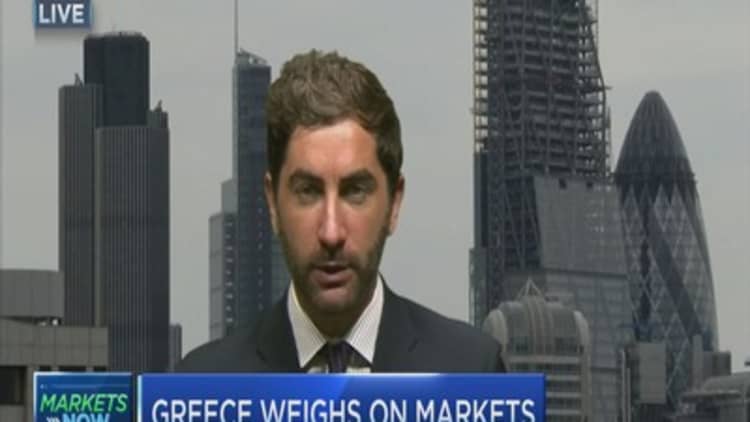Greece may prove to be a temporary influence but it's likely to again dominate trading Tuesday, as traders watch the fallout in the oil market and elsewhere.
Stock futures were slightly higher, after Monday's decline. Treasurys were well bid, and there was market talk of hedge fund buying in the 10-year, taking the yield to 2.24 percent in morning trading. Oil was slightly higher after Monday's wild selloff.
The euro area heads of government were meeting Tuesday and Greece was expected to submit new proposals to meet its bailout terms.
Read More Few changes in new Greek proposal
"It'll certainly be Greece unless things melt down further in China. Then that one will come to the top," said Randy Frederick, managing director of trading and derivatives at Charles Schwab.
China's emergency measures to stop the decline in its volatile equities markets were a major undercurrent in markets Monday, as headlines on Greece sent repeated ripples through global financial markets. Shanghai stocks fell another 1.3 percent Tuesday.

Oil traders blamed part of the near 8 percent decline in West Texas Intermediate crude futures on the fact that they fear a slower China would mean less demand for crude.
Read MoreOil crushed by worries on Europe, Iran
But they also were fretting about concerns that Greece would damage the European economy, and that an Iranian nuclear deal could end up adding more crude to an already oversupplied market.
"It's really hard to untangle all of that," said Michael Wittner, head of commodities research Americas at Societe Generale. "It's impossible to say how much is due to different factors."
What was clear was the steep decline caught many in the energy market by surprise with WTI breaking through several key technical levels and expected to fall further. Energy was the worst-performing sector in the equities market, losing 1.3 percent.
Stocks ended lower Monday but were volatile, swinging higher and lower. The S&P 500 lost 8 to 2,068. Treasury yields fell, as investors sought safety in bonds. The dollar also gained and was gaining again Tuesday as the euro slipped t o $1.09.
Read MoreMarket check: Will S&P 500 selloff steepen?
"The biggest takeaway for capital markets is that fear is back," said Boris Schlossberg, managing director of foreign exchange strategy at BK Asset Management. The dollar gained against the euro, which was at $1.10 in late trading Monday.
"The euro is in a state of suspended animation for the time being. Everyone is trying to figure out what happens next," Schlossberg said. Both sides need a positive outcome, and one scenario would be a deal to allow Greek banks and the economy to be revived while the creditors work behind the scenes on some type of debt forgiveness, he said.
If there is no deal, the euro could lose ground more quickly, and it would be far worse if there's contagion.
"If there are signs of problems outside of Greece, then maybe the euro goes on a mad bender to the downside," Schlossberg said. While European sovereign debt spreads have widened, they are so far showing no signs of serious trouble elsewhere in the euro zone.
German bund yields fell Monday, as investors sought safety there and in Treasurys. The U.S. 10-year was yielding 2.28 percent. Bund yields were lower again Tuesday, the sovereign debt of peripheral Europe also was bid higher, erasing some of Monday's moves.
U.S. data Tuesday include international trade at 8:30 a.m. EDT, JOLTs job openings data at 10 a.m. and consumer credit at 3 p.m. There is a three-year auction at 1 p.m.
"I think the (Greek) headlines are going to be much more significant. Let's face it. The big news of the month is already out. You had ISM and employment. The next major news is going to be the Fed minutes (Wednesday)," said Arthur Bass, COEX Partners managing director.
Read MoreECB maintains Greek banks' aid, but adjusts haircuts
Bass said the minutes from the U.S. central bank are on the radar of a market that increasingly is betting the Fed will delay its first rate hike until next year. "We're now down to estimating a 25 percent possibility for September for the Fed going," he said. "If this is going to be blowing up in Greece, it's going to be hard for the Fed to tighten in September."
"I'm looking to buy the dips (in Treasurys) until proven otherwise," he said, adding the Greek drama could drag on. Bass said he's also watching China as a possible negative.
Jonathan Golub, chief U.S. market strategist at RBC Capital Markets, said Greece could be a short-term negative for stocks, which should shift focus to earnings when the second-quarter reporting season picks up next week.
He does not view it as a catalyst for a correction and said it could be a long time before the market sees a 10 percent pullback again.
"It's not unprecedented to have extended periods of low volatility, and that's what we're in. China's not a concern in terms of the market near term, but China's actually a bigger deal," he said. Golub noted that China pushed investors into its equities market, and now it's pulling back.
Read MoreExpert predictions on what lies ahead for Greece
"It should not make us comfortable that the government is getting involved in protecting the market and putting a floor under it, or on the other hand of getting people into it," he said.
Golub said growth in China has slowed and that's been clear in freight shipments and electricity use.
"What you see is the growth rolled over not just recently but more broadly. The U.S. market is not going to fall apart because of this. ... But I do think it's an important element of a broader story if people convinced themselves that China was going to pull the economy forward," he said. "China as a solution to the world's problems is not something we should look to."



